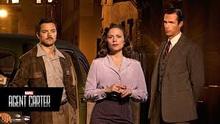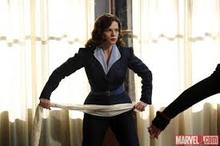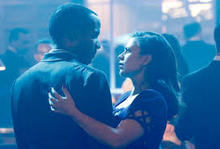Superhero TV: That’s Agent Carter To You
 I don’t know how I forgot “superhero” when I wrote about characters and their jobs a couple of weeks ago, but I was powerfully reminded of my lapse – and inspired – by two excellent posts from my friends and fellow BG bloggers, Derek Kunsken (Supergirl) and Marie Bilodeau (The Flash). Today I’d like to put in a word for the Marvel TV universe, where there’s at least one heroine that’s neither an alien, nor a human with superpowers: Peggy Carter of the Strategic Scientific Reserve (SSR) is 100% human.
I don’t know how I forgot “superhero” when I wrote about characters and their jobs a couple of weeks ago, but I was powerfully reminded of my lapse – and inspired – by two excellent posts from my friends and fellow BG bloggers, Derek Kunsken (Supergirl) and Marie Bilodeau (The Flash). Today I’d like to put in a word for the Marvel TV universe, where there’s at least one heroine that’s neither an alien, nor a human with superpowers: Peggy Carter of the Strategic Scientific Reserve (SSR) is 100% human.
A number of factors make this show stand out for me. For one, the creators have managed to pull off a series that is a little bit prequel, a tad bit sequel, as well as a sort of spinoff, that doesn’t rely on deep knowledge of either Captain Americ or Agents of Shield – or anything else in the Marvel universe for that matter. Plus, it avoids the drawback of most prequels: you know who isn’t going to die.
 A lot of attention has been paid to Supergirl, from the female-empowerment angle, but I’d argue that Agent Carter is more significant from the feminist point of view precisely because Peggy Carter is a human woman, not an alien. Supergirl, as a character, is a fine example of what feminist criticism calls “the other,” the idea, in part, that women can only be strong and “super” if they’re somehow not human.
A lot of attention has been paid to Supergirl, from the female-empowerment angle, but I’d argue that Agent Carter is more significant from the feminist point of view precisely because Peggy Carter is a human woman, not an alien. Supergirl, as a character, is a fine example of what feminist criticism calls “the other,” the idea, in part, that women can only be strong and “super” if they’re somehow not human.
That’s where the post-war period of the show is significant. By choosing to tell the story of a woman in that time period, the creators of the show were forced to address the treatment of women in that era. Supergirl is not only non-human herself, but she and her human sister live in our time, where attitudes towards women, especially in the workplace, have altered considerably since Peggy’s day.
 In the very first episode, Peggy experiences something that commonly happened to women in the workplace as men were returning from overseas. Most of us already know that with the shortage of men during WWII, women held many jobs that had been traditionally male. When soldiers returned at the end of the war, these women were expected to return to their former lives, and many of them – Peggy Carter being no exception – saw no reason why they should. In a second-season episode, a pre-war flashback shows us just how far Peggy has come.
In the very first episode, Peggy experiences something that commonly happened to women in the workplace as men were returning from overseas. Most of us already know that with the shortage of men during WWII, women held many jobs that had been traditionally male. When soldiers returned at the end of the war, these women were expected to return to their former lives, and many of them – Peggy Carter being no exception – saw no reason why they should. In a second-season episode, a pre-war flashback shows us just how far Peggy has come.
 Not that women were the only people who found the post-war world was a lot more like the pre-war one than they were expecting, considering what they’d done during the war. Jason Wilkes, a negro – as they would have put it in those days – physicist, also experiences a level of prejudice and exclusion he’d hoped the war had helped to change. When he and Agent Carter develop a romantic interest in each other, it only underscores how both are “outsiders” in the America of their time.
Not that women were the only people who found the post-war world was a lot more like the pre-war one than they were expecting, considering what they’d done during the war. Jason Wilkes, a negro – as they would have put it in those days – physicist, also experiences a level of prejudice and exclusion he’d hoped the war had helped to change. When he and Agent Carter develop a romantic interest in each other, it only underscores how both are “outsiders” in the America of their time.
Still, Agent Carter doesn’t spend any more time fighting male oppression than she has to – she spends her time fighting bad guys. Her business-as-usual take on herself and her job speaks louder for women than any number of times that she corrects someone who thinks she’s a secretary. Her society’s attitude toward women is, in its way, just another accurate historical detail.
Look for more posts in this series as “Superhero TV” continues with Derek Kunsken’s DC Legends of Tomorrow on the 27th, and Marie Bilodeau’s Jessica Jones on March 4th. Follow along with all the installments:
Watching Supergirl With a 10-Year Old — Derek Kunsken
Remembering Fun: The Flash — Marie Bilodeau
Exploring the Dark Mysteries of Gotham — John O’Neill
That’s Agent Carter To You — Violette Malan
Legends of Tomorrow — Derek Kunsken
Arrow — Derek Kunsken
See all of our coverage of Movies & TV here.
Violette Malan is the author of the Dhulyn and Parno series of sword and sorcery adventures (now available in omnibus editions), as well as the Mirror Lands series of primary world fantasies. Find her on Facebook and follow her on Twitter @VioletteMalan.
Carter is one series that I haven’t seen yet. I have a long line of tv series that I want to watch in a marathon.
I read the Captain America comic series and some of the best stories were centered around Sharon Carter who was the sister of Cap’s old flame Peggy Carter. Cap was frozen in ice at the end of WW2 and so he doesn’t know that Peggy is still alive in a nursing home. There was a terrific moment when Cap finds Peggy and for a while the two try to rekindle a relationship in perhaps the weirdest three way romantic triangle made possible. Peggy is in her 70s, Cap is still a vibrantly preserved man in his prime and Sharon is deeply confused by the whole mess. I remember as a kid I was a little upset that Cap seemed to set aside Sharon for Peggy and was actually confused by who he should be with. I also felt he was a bit of a jerk for dropping his girlfriend who I thought was pretty cool to be an agent of SHIELD.
For those who have never read the comic series they are seeing the Captain America timeline unfold in a completely different way. Because First Avenger came out we see the relationship between Cap and Peggy as it occurred and for me, the whole love triangle thing makes sense with older eyes. Peggy was his first love.
I’m looking forward to viewing the series largely because I think the movie got the Peggy Carter character right. She is a true feminist but she is another feminist that I can relate to. My great grandmother was an original sufferagette. I try to tread carefully about this topic because it isn’t my intention to insult, demean, marginalize, or make it unbearable to share discussion with women on this forum.
The subject of what happened to women when men returned from the war is historical and yes, it did happen. I don’t like to see boorish men who treat women badly. I hope when I see the series that it doesn’t paint men out to be a bunch of pigs. Both of my grandfathers never acted that way and I do not like it when I see all the men made out to be like that because it spins a dark message. I would also like to see some sympathy for the men who were displaced. Can you imagine fighting a war only to return home to a family that had moved on? That would be devastating.
Also, it is fine to show how African Americans had to face a populace that wanted them to go back to the way things were before the war. I would love it if they showed how the white people turned against that notion and accepted them more. It is time to show that all whites were not racists and probably the majority were emboldend by the war to stand with African Americans.
Also, isn’t it time we saw on TV new civil rights heroes? Hector P. Garcia is one of the first Hispanic leaders who advanced civil rights. As a doctor in WW2 he was treated like a DOCTOR with all the respect doctors were accorded by the Europeans. Then when he returned to the states a friend who fought in the war was refused to be buried at the Veterans Memorial Cemetery because his friend was Hispanic and as bizarre as it seems now, graveyards were segregated back then. So Garcia took the Veterans Memorial to task and made it so any veteran of any heritage is allowed to be buried in a veteran cemetery. I’d like to see that too.
Again, I’m not trying to stage any trouble. You make it sound like a fun series from a new perspective. I told my wife about this series and we might kick it up a few ranks in the line.
@Violette, I hadn’t considered taking up Agent Carter. If watching Jessica Jones continues to make me feel as if I’ve been stuffed into a burlap sack and kicked right along with the character when I watch it, I may switch shows. JJ has many forms of excellence, but fun only shows up for a few moments per episode.
@Ape, I enjoyed your long, thoughtful comment. Especially this part:
I would also like to see some sympathy for the men who were displaced. Can you imagine fighting a war only to return home to a family that had moved on? That would be devastating.
I think one of the reasons we see our current wars’ returning vets having such a hard time is that a few do come home to that reality, and even the majority whose families have not moved on deal with understandable anxiety about the possibility. Now, when our work force functions differently from the way it did during and after WWII, it’s easier to sort out that pain and concern from the issue of who gets to be a/the breadwinner. Then, as now, it was probably less anxiety-inducing to talk about economic displacement than feelings of abandonment. We’re social primates, familial primates, and abandonment is one of the Big Vulnerabilities for us all.
Stories dealing with that vulnerability can certainly be epic. The Odyssey is, ultimately, the story of a returning veteran who’s not sure what he’ll find when he gets home. If someone whose personal experience was closer to this cluster of issues wrote an Odyssey for our time, I’d read it, genre or not.
@Sarah–that is a salient point about the Odyssey.
One of the changes that WW2 brought was that women competently replaced men in the workforce and afterward it was impossible to put the genie back in the bottle. For a time women returned home to the most important job in the world, in my view,—wife and mother. The 50s were booming for America and for a time two incomes were not needed. When the boom ran out of steam many families needed a second income or at least a supplement. Women going to work was inevitable.
I’m grateful that Rosie the Riveter set it in motion the events that led to today where no one blinks when a daughter aspires to do any job or hold any office. They sky is the limit. I’m glad that my daughter does not have the restrictions that my mother or grandmother had on them. What pains me is that the traditional role of being a mom is often scorned. I think some woman can meet that balance between career and motherhood but many can’t and I think our society suffers for it. I’m not knocking feminism on this nor would I want women to be forced back into their traditional roles. I would, however, like to see full time moms affirmed as viable and noble options in stories. Our society places no value on being a mother I think. For instance, if you have been a stay at home mom for a few years and you want to go back to work look at what the job applications would show—unemployed. Find one positive trait associated with that prefix and unemployed sounds very idle. Most full time mothers I know find raising kids a full day’s work. Sure, there are those that sit around eating bon-bons and watch reality TV but I don’t think that is the case with most. I certainly know that most work more than 40 hours a week—serious moms that is. I hear feminists decry the stay-at-home mom as somehow less a woman than the career mom. This attitude repels me. For me there is either a good woman or a bad woman and they can be full time moms, career women, or career moms. I sneer at the bad ones.
“I think one of the reasons we see our current wars’ returning vets having such a hard time is that a few do come home to that reality, and even the majority whose families have not moved on deal with understandable anxiety about the possibility.”
Deployments are rough not only for the men but for the wives as well. If you tallied up my deployment time I was gone for 11 years in deployments alone. That doesn’t count work ups or duty or the little one or two week jaunts to some desert somewhere. During that time my wife was in effect a single mother. A third of my career I was paid so low either at or below the poverty line. A third of it I was paid maybe around the average median pay and only in the last few years did we live above the median. My wife, like other military wives made it all work with the leanest resources and under the most stressful conditions. I once had to live in an affordable apartment in a rough neighborhood which was broken into twice and once had a guy stabbed on our front door while my wife protected kids inside hoping the gangwar outside wouldn’t enter our home. This happened while on deployment. Military wives have to change jobs and rarely have careers because the military life is too nomadic. My wife is a hero in my eye because she has proved herself to be a pioneer woman who could take the arrows of adversity. She never had an easy day and was the Rock at home. She is a real life Agent Carter in my eye.
I hope the stories of this series are a bit broader than the usual stereotypical stuff. I hope the men aren’t strawmen stereotypes that are too goofy to be believed. I’ll give this a try.
I grew up an Army brat. My father’s draft number came up, and though he opposed the war in Vietnam and could have hiked to Canada from his hometown, he couldn’t abide the thought that someone else would be forced to take his place. He stayed for 20 years, and would have stayed longer but for downsizing. Though he never saw combat, he did a lot of traveling. We had some years when he was gone more than he was home. I can barely imagine what that would have been like if we’d had good reason to fear he might not make it back.
One change I’m glad to see in Millennial-generation feminism is that parenting work gets a lot more respect than it used to. The old conflict between stay-at-home mothers and work-outside-the-home mothers is, these days, mostly something the media tries to gin up when there’s no real news they feel like reporting. Increasingly, women of an age to have young kids are not interested in letting this old media fixation divide them.
I’m older than most of the moms I know with kids as old as mine. Often I’m the lone Gen-X person in a roomful of early-reproducing Millennials. And although they often take for granted the rights and freedoms that I watched my mother’s generation suffer to win for all of us, overall, the kids are all right — both the twentysomethings, and the twenty-or-so-monthlings.
It helps that Gen-X dads and Millennial dads really are trying to step up when it comes to co-parenting and household work. The stigma against being a stay-at-home dad is fading, and in some social circles is close to gone, even if it is still a choice rarely made. Dads with jobs are taking parental leave, and agitating for the work-life balance flexibility that used to be considered women’s issues. There will always be some basically mammalian things that only women can do for their families, but I think if the trends I see around me keep going for a couple more generations, we can hope to see a less adversarial dynamic between men and women generally as people of all kinds who parent try to make the world better for families.
The mothers and fathers I know would all agree that the most important thing they do is parenting. The second wave feminists who are dismayed to hear their daughters say that would be a lot less dismayed if they noticed they were also hearing it from their sons.
WildApe,
Do it. It’s a good show.
The sexist/racist stuff is very much in the background and not super forward, and I found it realistic. Some people are like “You can do your job? Great!”. Some treat peggy with respect, but then undermine it by calling her sweetheart or toots. It’s a lot more subtle than you fear, it sounds like. If a character’s a boor, it is no way meant to be an insult on all men; it just means that guy’s like that, and generally you’ll find out it’s a function of pure naked ambition, or overcompensating for something else, or just general anger. And there’s plenty of female villains, too, for all the same reasons.
But more than that, it’s a cool pulp fiction show with weird science, mixed with post-war, red scare paranoia. Good action. The characters are interesting and compelling. I highly recommend it. I’m hoping it gets picked up for a third season.
I’m reading lots of Hellboy graphic novels, too, so lots of blazing .45’s and weird nazi science for me this winter… if you like those, you’ll like Peggy Carter.
@hessian—Okay–you completely sold me when you said,”weird science, mixed with post-war, red scare paranoia”. I’m there!
@Sarah—I did not know you were an Army brat. You know exactly what I’m talking about then. And you are right that there is no substitution for parenting.
I think the best moment in Captain America: The First Avenger is near the end when Cap and Peggy are talking to each other as he rides the bomber down and the sun is setting on him. They both know that he won’t make it back. I never cared for the Peggy Carter much until that movie. It will be good to see her after the war. Also, I would like to know her past. How was this woman made and formed?
“How was this woman made and formed?”
Hey Ape,
We get to see some of that in the second season, which I’m generally liking even more than the first season. It’s my favorite of all of the “modern” “superhero” shows. I guess Carter isn’t modern anymore than it’s about a superhero, but you know what I mean… Certainly it’s the only one my wife and I go out of our way to watch.
If we’re in the mood for some small screen superhero stuff we’ll probably just pull out the DVDs of the Batman Adventures or Justice League from a few years back when Bruce Timm and Paul Dini were in charge of them. Those guys did it right.
Thanks for all the great comments, guys. Every reply I thought of while reading each was covered by someone else. You will definitely enjoy the series, those of you who haven’t seen it yet.